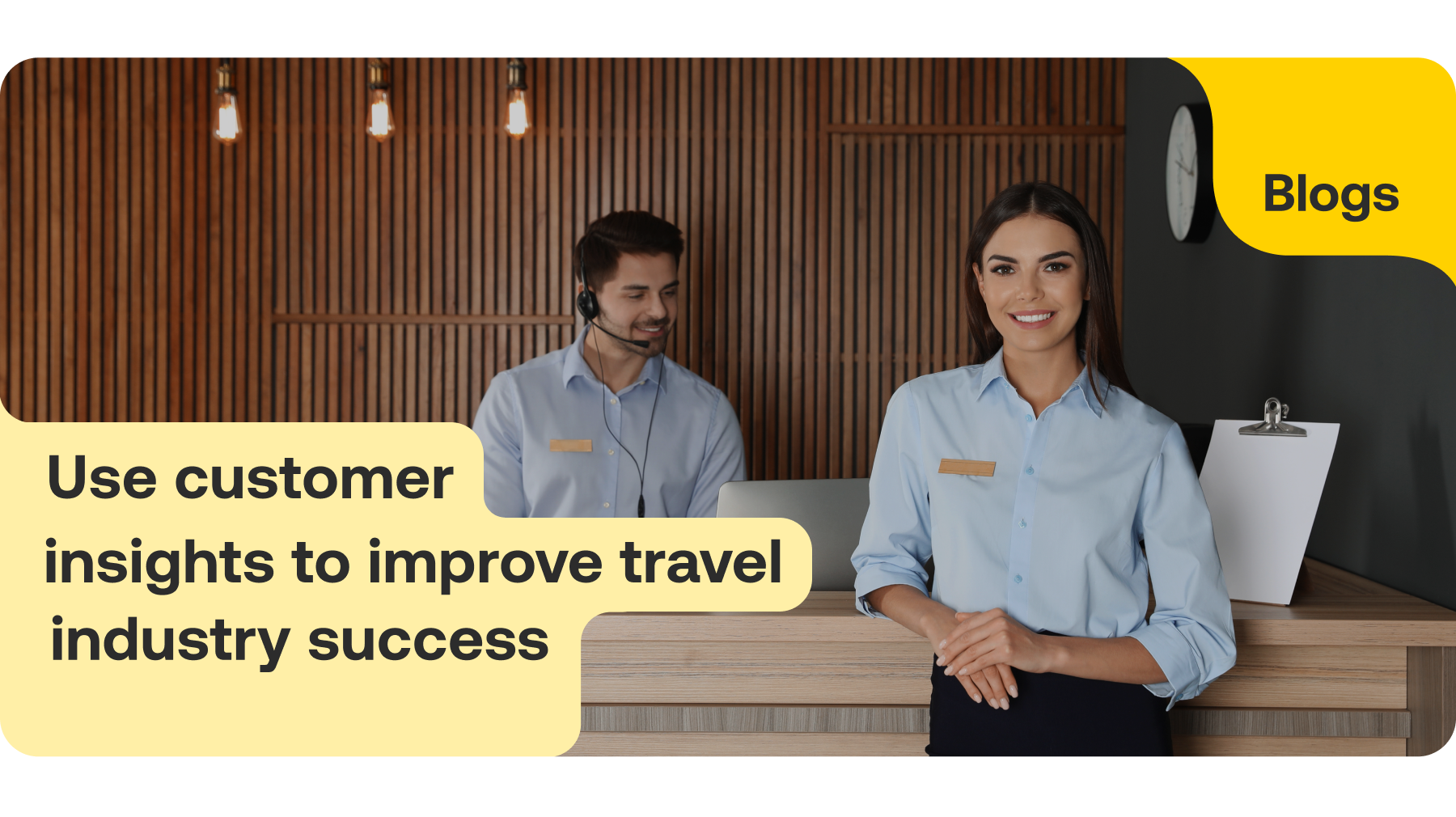Today's travellers have high expectations. And when they do spend or commit to booking a trip, they expect everything to work as planned. Travellers are keen to explore new destinations, try new things and meet new people, and their expectations for every aspect of their trip are higher than ever. A rising number of people are turning to travel agents to book every aspect of their trip for the reassurance of quality. So, how do businesses continue to deliver what today's travellers expect?
An overwhelming majority of customers who book online read reviews to guide and affirm their decisions. This leaves businesses with the challenge of displaying authentic feedback at strategic touchpoints, such as holiday listing pages and booking sites. Collecting and analysing reviews in the travel industry isn’t just about helping customers; it's a fundamental element of delivering exceptional service and staying competitive in a rapidly changing industry.
Current travel industry trends
After the difficulties endured by the industry during the Covid-19 pandemic, numbers show that people are returning to their travel plans.
-
UK residents are projected to make over 90 million outbound trips in 2024, rising to over 92 million in 2025.
-
Overseas residents are estimated to have made 41.2 million visits to the UK in 2024, with a forecast of 43.4 million visits in 2025.
-
Overseas residents are estimated to have spent £31.5 billion on their visits to the UK in 2024, with a forecast of £33.7 billion in 2025.
-
UK residents are estimated to have spent £62.7 billion on visits abroad in 2024, with a projection of £69.2 billion in 2025.
Source: ONS
The ABTA Holiday Habits 2023-24 highlights three major trends around bookings, spending increases, and sustainability.
- By 2029, online sales are anticipated to generate 80% of the total revenue in the travel and tourism market.
- Holiday spending has increased, with many consumers opting for premium experiences, reflecting the findings in our Consumer Benchmark report; 63% of Gen Zers and 38% overall say they plan to spend on indulgent items in the next three months, including travel.
- 74% of people say that sustainability practices are important to them when choosing a brand.
Why consumer insights are essential for the travel industry
With travellers wanting the best experience for their money, they want to be certain that they can trust the business to provide the experience they’re looking for. Reviews aren’t just about social proof though. By making use of the insights contained in reviews, businesses can enhance their services and build stronger relationships with guests, contributing to their long-term success.
Hospitality reviews impact brand reputation
Word of mouth has always been the most powerful type of marketing in the tourism sector. There’s nothing more compelling than hearing from someone like you talking about their experience with a company. Today’s word of mouth isn’t just about what your customers tell their friends and family when they get back – they share their experience on social media, and in the feedback that they leave for you. Since those reviews can be accessed by anyone, anywhere, in many cases indefinitely, businesses must provide great service to ensure their feedback is good too.
Hotel customer reviews spotlight your service
When visiting a hotel, for example, customers want to know that staff will cater to their needs, so customer service in the hotel industry can make or break an establishment. Customers check reviews to find out the experience that other people had with you; and those reviews are a powerful testament to your outstanding customer service.
Displaying reviews shows potential customers that you’re proud of your service, and whether they are good or bad, they will impact the rate at which new bookings are made.
Most people (96%) will actively seek out negative reviews before making a purchase decision. But negative reviews might not be the problem they seem initially. Often, negative reviews are left for niche or specific issues, such as a lack of childcare facilities. Prospective bookers will trust the positive reviews more: they can see the negative stars are based on issues not relevant to them. If you respond, it showcases your attention to customer service, adding further reassurance to the booker. And if you’ve replied to the review, so much the better.
Responding to customer reviews is a must
The easiest way to show potential customers that you care about them is simply to reply to reviews. If you reply to all reviews – both good and bad – that shows customers that they are more likely to have a good experience with you.
Our research shows that 31% of consumers expect a response to their review of a brand – regardless of if it is a positive or negative review. If they’ve taken the time to leave feedback, they want a deeper connection with your brand.
Replying to reviews means customers feel heard, and are more likely to become an advocate for your business in the longer term – even if they had a negative experience. Our research suggests that 44% of people who said they had left negative feedback for a business would use the business again if they received a satisfactory response. And of course, if you’ve implemented change as a result of a review – such as making a special dietary option available at breakfast, for example – communicating this in your reply will encourage customers to book with you.
Using hotel customer reviews to enhance the customer experience
Providing the service that keeps your hospitality reviews positive is never-ending. Even if you’re doing everything by the book, you can’t guarantee it is right for your customers unless you’re actually listening to them.
Reading customer reviews individually might be possible for smaller businesses, but for larger hotels and travel businesses, managing and responding to hospitality reviews manually is not scalable.
This is where automated tools can provide the support businesses need to streamline responses while maintaining personalised engagement. Platforms like Feefo can categorise reviews, highlight key themes with sentiment analysis, and automate personalised responses, so that feedback – whether positive or negative – is handled efficiently.
By implementing these systems like automated review responses, businesses can identify recurring issues and make data-driven improvements to create even better experiences for future guests.
Publicising the changes they have made thanks to the feedback received shows customers that their review contributed positively to the long-term success of the business.
Improving the customer journey in hotels based on real insights
There’s so much more to the customer experience than them booking, visiting, and leaving. They have multiple touchpoints along their journey with you, and providing the opportunity to leave feedback at each point can help you identify gaps and opportunities for improvement.
For instance, CV Villas, a luxury villa rental service, utilises customer insights to refine their offerings, ensuring every interaction enhances the guest experience. Using Feefo’s Feedback Request Manager, they automatically invite customers to review their experience at different points – just after they had booked their trip, while they are at their destination, and when they return home. This gives them a better understanding of their customers experiences, and by analysing customer feedback, they continue to improve their experiences , leading to higher customer satisfaction.
Read more about providing value across the customer journey.
Getting the right travel industry software to track trends and customer preferences
When you’re choosing how to collect customer feedback in the travel industry, there are a number of review management platforms that you can choose from. The main choice being, do you want to collect reviews from verified customers, or use an open platform?
Genuine customer insights are key to your success
When you’re making business decisions, you need to be able to depend on the insights in your customer feedback. Collecting verified reviews means that you can be certain that the person leaving the review actually had an experience with you.
On an open platform, people who haven’t even interacted with your business can leave reviews, potentially damaging your reputation. TripAdvisor research shows there’s been a 267% increase in fake reviews in the travel sector since 2018; that’s a very real threat to your business.
The one challenge that verified-only platforms have is that if a customer doesn’t leave their email address or chose not to engage with your business after an interaction, you can’t capture their experience.
To be able to capture those insights, some businesses are utilising both types of platform – verified and open.
What can the travel and tourism industry do next?
Understanding your customer feedback is the key to knowing your customers, what they want from you, and how you can continue to make improvements. Finding the most effective way to collect hotel customer reviews should be a priority. You should also ensure that the review collection system allows you to analyse the data effectively, so that you can base business decisions on what your customers are asking for.
For a more complete understanding of how the Feefo platform can work for your business, book a call. A member of our team can explain how Feefo can make an impact on your business, whether you’re running a boutique hotel, or you’re in charge of a bigger operation.



